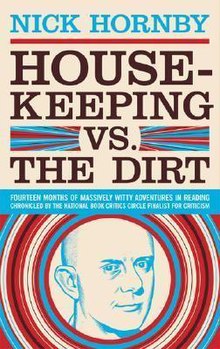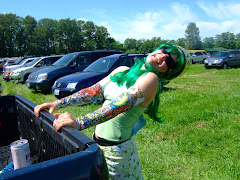Bumped by Megan McCafferty offers a glimpse of a future in which a virus has rendered adults over 18 infertile, thereby making the wombs of teenage girls highly sought-after property. Twin sisters separated at birth when their own parents used a surrogate are reunited when one of them discovers she has a twin and leaves the conservative religious colony where she has been raised to seek her sister. She finds her, and discovers her twin is in negotiations to have her first child. Things get complicated when the two girls are mistaken for each other by the players in the surrogacy transaction. It sounds cheesy (twins separated at birth! mistaken identity! sinister money-grubbers!) but it actually works--entertaining and thought-provoking at the same time.
Housekeeping vs. The Dirt and Shakespeare Wrote for Money, both by Nick Hornby, a.k.a. my mental husband. Nick Hornby (About a Boy, High Fidelity, Juliet Naked) is the shit. Smart, absolutely hilarious, and brilliant when it comes to writing about reading and books. Both of these are collections of essays he wrote for The Believer, in which he lists the books he purchased and books he read each month and then reviews them--sort of. Mostly, he talks about reading, why it matters, how it differs from reader to reader, and how much richer life is when it is full of books and words and people who love both.
A Billion Wicked Thoughts: What the World's Largest Experiment Reveals about Human Desire by Sai Gaddam and Ogi Ogas combines two of my favorite things: science and sex. The authors conducted a modern-day Kinsey study using the internet, a bunch of complicated algorithms and data filtering techniques that I will never understand, and collated their findings to come up with numerous fascinating theories about human sexual behavior based on the sexual images and text that people seek when they surf for satisfaction online. Their findings reinforce some truisms: men are more turned on by pictures than women; women like to read erotic stories more than watch porn, and Rule 34 is definitely true: if you can think of it, there is porn of it. This book was fascinating, entertaining, thought-provoking, and I will read it again soon, which is saying a lot because I don't usually read books more than once anymore.
 Elliott Allagash by Simon Rich, a writer for Saturday Night Live, is the author of two hilarious collections of humor, Ant Farm and Free-Range Chickens. In Elliott Allagash, his first novel, he writes of a teenage underdog Seymour Herson, who becomes the pet project of his exorbitantly wealthy, clever, and potentially evil classmate, Elliott Allagash. Allagash is the son of another evil-doer, and between the two of them, they manipulate, trick, and arrange other people and circumstances for amusement and personal gain. It’s all very funny and extremely clever. I loved Rich's previous books, which are collections of short, humorous essays: Ant Farm and Free Range Chickens.
Elliott Allagash by Simon Rich, a writer for Saturday Night Live, is the author of two hilarious collections of humor, Ant Farm and Free-Range Chickens. In Elliott Allagash, his first novel, he writes of a teenage underdog Seymour Herson, who becomes the pet project of his exorbitantly wealthy, clever, and potentially evil classmate, Elliott Allagash. Allagash is the son of another evil-doer, and between the two of them, they manipulate, trick, and arrange other people and circumstances for amusement and personal gain. It’s all very funny and extremely clever. I loved Rich's previous books, which are collections of short, humorous essays: Ant Farm and Free Range Chickens.Beauty Queens by Libby Bray
What if a group of teenage beauty queens crash-landed on a deserted tropical island and had to learn how to survive without their curling irons and manicurists? That’s the premise of Bray’s work, and it’s perfect for a wickedly funny send-up of our celebrity-obsessed, appearance-minded consumerist culture. The story is like a mash-up of Glee, America's Top Model, The Daily Show, and late-night informercial. Very fun, and very funny, but with some real material to think about, too.
Drive: The Surprising Truth about What Motivates Us by Daniel Pink helps explain why I took off for a summer of solitude and competition. Pink spent years studying human behavior, specifically motivation, and found that typical strategies used to encourage better performance are misdirected and based on psychology over a half-century old. Instead of being motivated by rewards and threats of punishment, Pink asserts, humans are compelled towards accomplishment by a desire for autonomy, mastery of their skills, and a sense of purpose, and he uses scores of examples from recent psychology, neurology, and culture to illustrate his theories. Success in the future--both for employees and those who manage them--will depend on workers who are motivated intrinsically by a desire to complete a project or see an idea to fruition because they love it, and by managers who recognize this kind of desire and make it the standard operating procedure of their company. Choosing people who love their work and then getting out of their way and trusting they will do it is the key to good management, Pink asserts. Teachers, parents, personal trainers, and anyone who wants to help themselves and others in their lives achieve their potential will find something worthy to take from this book.
Bold Spirit by Linda Lawrence Hunt is the story of Helga Estby and her teenage daughter, Clara, who walked from Spokane to New York in 1896, making my little drive around the Southwest feel remarkably luxurious in comparison. Estby, the mother of nine, undertook the endeavor in order to win a cash prize that will save her family from financial ruin. Her journey and its consequences were unspoken of by her immediate family and her descendents for years after, and much of her story was lost. Hunt recreates as much as possible the trek the women undertook, its impact on her family, and the powerful importance of story-keeping and story-telling.
In You Know When the Men Are Gone by Siobhan Fallon, interconnected short stories reveal the inner lives of and family secrets of women and men living in Fort Hood, Texas, one of the drive-by locations on my journey. From the outside, there’s nothing out of the ordinary about the insular Army community, but as this collection demonstrates, there is always a story beneath the surface. A cancer-stricken mother is bewildered and shaken by the disappearance of her belligerent teenage daughter; an intel officer sets up surveillance on his wife, a wife readers her husband’s email and discovers unsettling possibilities about marriage and military service—as do all of these amazing stories.
Bad Dog: A Love Story by Martin Kihn is the only dog-memoir I’ve read specifically about the Bernese mountain dog—the breed of my dog, Frida, who accompanied me on my roadtrip. In Kihn’s story, his marriage is crumbling due to alcoholism, and his badly behaved Berner, Hola, doesn’t help matters by terrorizing his wife. When Kihn’s wife leaves, he is determined to win her back. In addition to quitting drinking, he undertakes to re-train Hola and earn the Canine Good Citizen medal, an AKC honor for pet dogs that fulfill 10 behavioral requirements. The story of Hola and her human’s adventures to improve themselves and win back their woman reveals the fun and frustration of dog-human partnership and is a terrific read for anyone who loves—and is sometimes exasperated with—their furry friends.
I traveled through Austin, Texas, one of my favorite cities, and spent several days enjoying the sun next to Barton Springs. In James Hynes’ novel, Next, Kevin Quinn flies there for a job interview in the wake of several missile attacks on U.S. cities. The entire narrative traces this one day in Quinn’s life, as the attacks prompt him to reflect on his relationships, past and present, and on the meaning of his life. His reveries take us through his chronology of love, sex, various infatuations, regrets, and current desires, concluding in one of the most unforgettable, stunning endings I’ve experienced as a read. I cannot stop thinking about this book.
How could I not read Rebecca Makkai’s novel, The Borrower, when it’s about a librarian on a road trip?! Lucy Hull, a 26-year-old librarian, helps a 10-year-old patron escape his fundamentalist parents, who are trying to “de-gayify” him in a controversial church program. Their roadtrip across the country struck me as implausible, but their relationship was authentic and moving. The two bond over a shared love of reading, and both are struggling with families they don’t understand—in Lucy’s case, their journey enables her to sort out her complicated feelings about her Russian émigré father, who has a mysterious past. Despite straining my credulity, I loved the road trip, the book references, and sweet, precocious Ian.
The Year We Left Home by Jean Thompson was reviewed widely late this spring--I think I read about it in Oprah, People, and Entertainment Weekly, so Thompson has a pretty good publicity team. But for good reason--she's an incredible writer. I loved this novel, which centers around the changes in the family over several decades, swinging between each of the four siblings and their parents as they move away from one another and pursue lives independent of one another and the small farming community where they were raised. If you liked Jonathan Franzen's The Corrections, you'll enjoy this one.
My American Unhappiness by Dean Bakopoulos was my favorite novel on the trip. Protagonist Zeke Pappas is the head of a government organization that distributes money for humanities projects and the overseer of a project on the reasons behind Americans’ unhappiness. As such, he interviews individuals and fields letters, phone messages, and emails from people unloading their burdens. His own unhappiness is another subject altogether—his estranged brother and sister-in-law have died, orphaning young twin daughters, and according to stipulations in a will, they will live with their mother’s sister out of town unless Zeke marries. His quest to find love—or at least-matrimony is only one of several subplots in this entertaining novel, at the core of which lies a secret that may explain all that is truly troubling Zeke.
On the other end of the spectrum, The Geography of Bliss is NPR correspondent Eric Weiner’s quest to discover not what makes people unhappy, but what makes them happy, and he travels to various points on the globe to what role, if any, geography plays in our happiness, any why places we’d expect to be misery-causing (isolated, freezing-cold Iceland, for example) are some of the most joyous on earth. Weiner, who admits that he’s not, on average, a particularly happy person, discovers and relates a great deal of wisdom about what makes a happy life, and his insights are often funny and profound. Weiner notes, in one chapter of The Geography of Bliss, that we often don’t know how travel changes us until long after the trip is over. I sure hope that the discoveries I made this summer, and the joy I found traveling, competing, relaxing with my dog, continue to surprise me and teach me in the months and years to come.










No comments:
Post a Comment